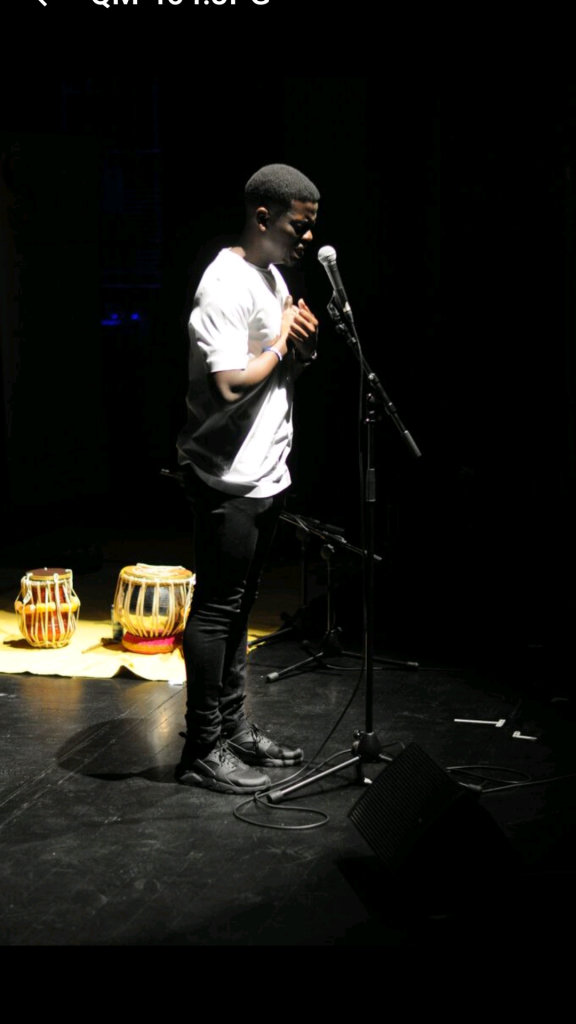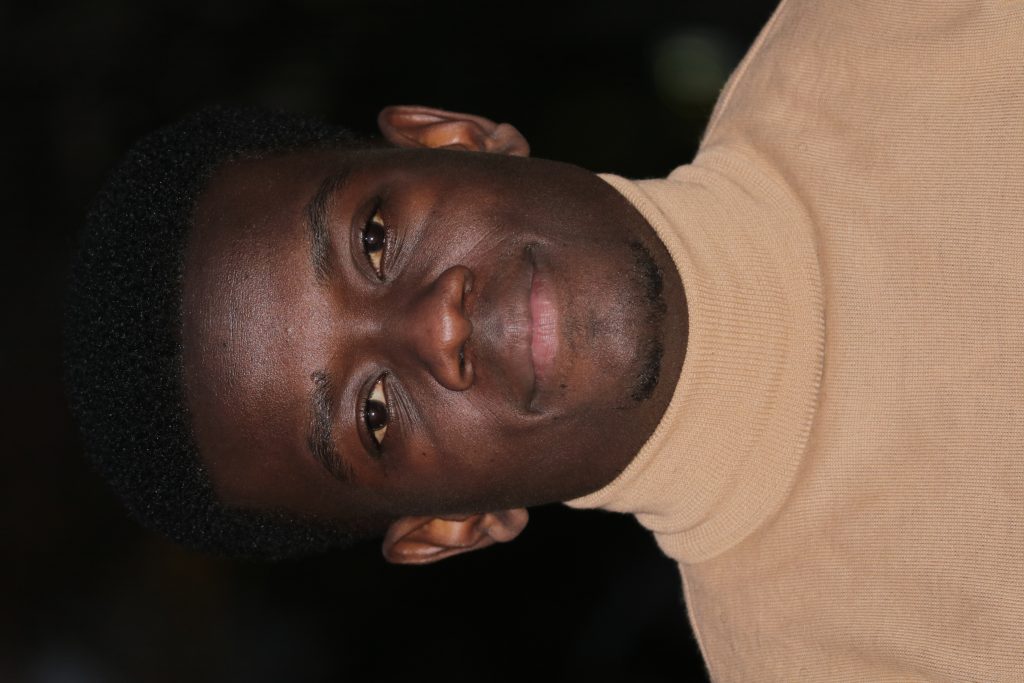In a time where crime in our capital is at an all-time high, the narrative we often see in the mainstream media is that black men are using violence to channel their pain.
This is only part of the story. There is a growing group of BAME men and women, using their experiences to inform their art.
In our 10 part feature, we meet some of these artists. These artists are swimming against the tide, creating a lane for themselves. They talk to us about the Cost of Artistry
3/10 Meet Samuel Cole
I find it frustrating when reading profiles of artists how little attention is paid to
With this feature, I want to give our readers an insight into those whose work I greatly admire the opportunity to have a serious discussion about poetry/rap, free from the usual angling of “page vs stage” or “new young star brings poetry out of the dusty library”.
We sat down with Samuel Cole and asked him
When did you discover you had a “talent”?
7 years ago I signed up to take part in a filmed project to highlight the positive contribution of young people in my borough. It was meant to be a filmed project but for some reason or another, the filming dates kept getting cancelled. Anyway, the project ended up not happening but I said I’d contribute by sending in an audio copy of a poem. I ended up writing a poem called Young Monarch. I sent it in and the lady who received it was blown away – that’s where it all began.
What have you had to sacrifice to nurture your talent?
Pride and ego. Just because I wrote a poem didn’t make me a poet. Neither did watching Def Jam Poetry regularly or reading Shakespeare. I had to move beyond treating it as a casual diary entry, humbling myself, developing a respect for the craft and sharpening my pen. That meant writing constantly, reading constantly and getting feedback on my work.
In sacrificing pride I learned to be vulnerable. That didn’t necessarily mean exposing my pain, but it did mean being transparent. Prioritising clarity and the content of my message above all else. When I performed, I began to see the stage as a place where ego died and the message was in the limelight. I needed to forget about looking ‘cool’ or ‘impressive’, being loud and an entertainer or seeking finger clicks from the audience and instead say something true that might actually change someone’s life.
Transparency meant talking about how I actually I saw the world. The things that actually bothered me or made me laugh. Ultimately I wrote not only to be understood but to understand – not to be admired. I learned that when I wrote about specific experiences, (rather than vague ideas that are detached from reality), my message resonated more deeply with those who listened. It’s a balance. On the one hand I needed to show more of ‘myself’ in order to be transparent, but not so much of myself such that I ended up blocking the message.
Who inspires your artistry?
Different people for different reasons.
CS Lewis because of his command of the english language and his ability to use words to conjure up an entire world in your head.
Lauryn Hill for her emotional rawness, and rhythm through her music.
Jackie Hill Perry for her straight talking lyrical tenacity.
Banwo The Poet for his genius wordplay.
Jolade, Caleb Femi, Theresa Lola for their ability to tell a story in such a way you feel as though you were in it experiencing it with them.
What is the biggest misconception people have about poets?
That we belong to a class of ‘elites’ in society out of touch with reality. Connected to that there is a misconception that all spoken word poets should recite their poems in a similar style – i.e. long pauses, stretched out words, change in tone for dramatic effect and so on. I think poets share a common desire to document in verse something they think is important, but there is no ‘one’ style.
In an age where digital echo chambers are growing wider, what role do you think poetry can play in this?
I think poetry is a useful channel to initiate a dialogue and invite fresh views on topics. It lends itself well to expressing alternative views in a way that is interesting to read or listen to. My favourite poets identify universal themes and still communicate their truth. They can craft a phrase like ‘Treat your homes like you live in them, even if your minds have mansions in the cosmos’ (Jolade Olusanya, Poem: ‘97) striking a chord with many and yet still maintaining the integrity of their own unique story.

Has a poem ever humbled or frightened you? What was it? When did it happen and what did you do afterwards?
I remember one of the first poems I performed publically called ‘How Long’. It was a message about not being lazy and seeking God. I was so eager to share it. I went to an open mic night and performed it. It lasted about 5 mins, and the crowd looked at me with stone cold faces from beginning to end. I was so confused. Afterwards I was told it was far too loud and far too preachy. I was crushed. In hindsight it probably would have worked better as a sermon than a poem!
Some poets claim that a poem is like a living creature: once it’s out there is not much you can do to ‘correct’ or ‘improve’ it, while others edit meticulously, not leaving much from the original, draft form. What is your take on it?
I think as the poet it’s your work and you can do whatever you please with it. I generally don’t tinker with published poems because I like drawing a line under a piece and letting it speak for itself at the time of its release – whether it’s perfect, imperfect, warts and all. Have I had new ideas for a piece after I release it? Of course! But for me, ultimately each poem is a flag pushed into the ground marking a stage and time in my life. There’s always more that could be done to embellish or improve a piece – simply because as time progresses we develop. Ideas which were true and firm for us before become amorphous and ambiguous, feelings that were intense and heartfelt become less impassioned. We change. It’s unfair then to force our current ideas and values to fit our older works. Almost as odd pouring new wine into old wineskins!
I do recognise that what gets posted online, stays online. I’m sharing my work with the world and let’s face it – not everyone has the energy to consume edit 1, edit 2, edit infinity of a piece. That would be exhausting! Imagine if Michael Jackson had 5 versions of Billie Jean or Lauryn Hill rewrote The Miseducation. There’s a misconception I think, that you must keep updating the poem to keep it alive. A piece is alive as long as someone can pick it up and feel something.

The question does feed into a wider conversation about art though. When is a piece of work really ‘finished’? When you publish it? When you think it’s ‘perfect’? For me it’s when you publish it, because I won’t publish something that I don’t think is finished. If it’s a great piece then why change it! If it sucks, then let it be! It’s a starting point which you progress from.
With all this being said I do adjust my pieces for live performances. The poem at its core doesn’t change, but the way I express it might. I may add a verse relevant to theme of the event, or switch a word that I feel is more potent at the time. I gauge the atmosphere in the room and ‘remix’ the words to suit. Through the remix of poems I’ve sometimes ended up creating a completely separate new piece entirely.
How do you define success?
When my message in my poem is clear and it resonates with the person listening.
Do you ever regret sharing your work publicly? Do you trust the reader in a world of instant gratification and instant communication?
No regrets here. By calling myself a poet I have accepted the mantle not just to be a spokesperson but to die to my ego in order that my message is unobstructed and connects with the audience. In stepping up to the mic or writing a piece I am not necessariIy seeking to put my trust in the audience. The real question is does the reader trust me? Do they believe what I am saying? Does what I am saying connect with them and can they find something of themselves in my message?
@OnlySamuelCole


